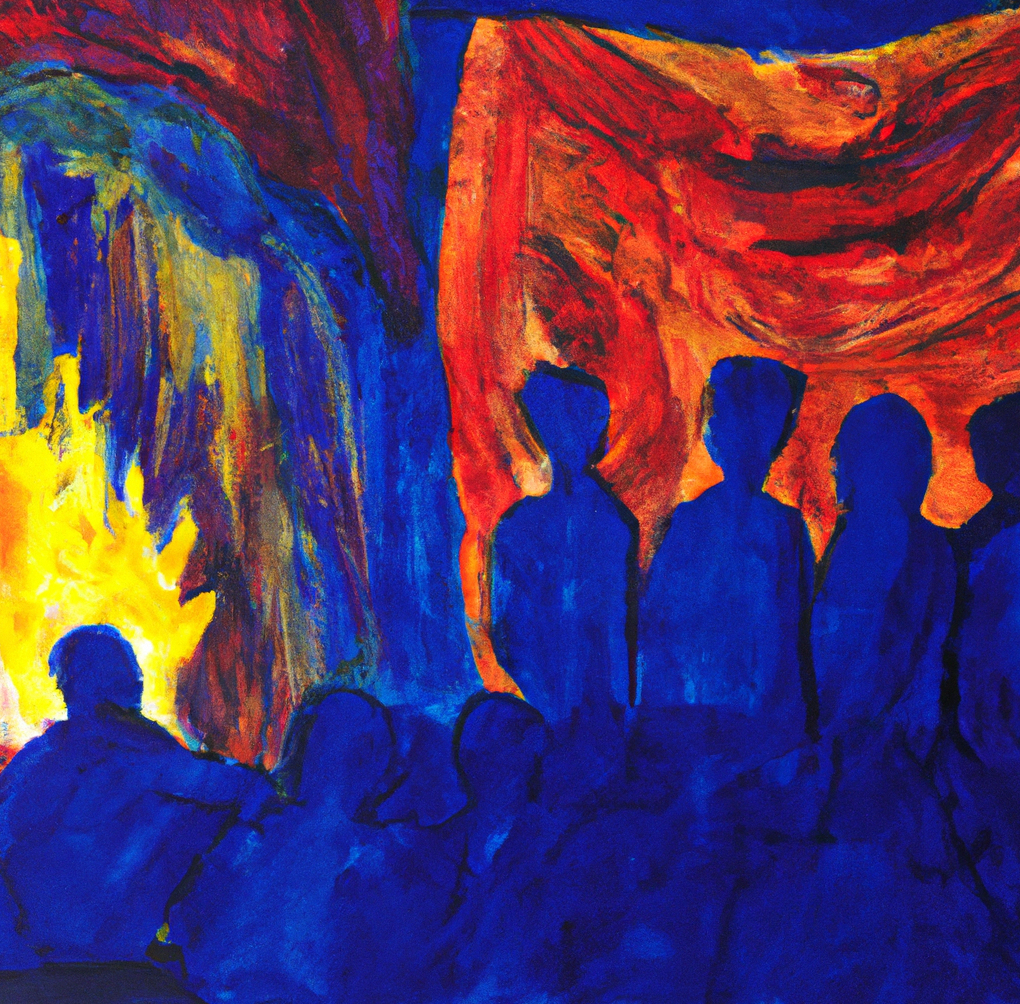are we cavemen? - WWOW! Weekly Words of Wisdom! published Wednesday April 2023

Wisdom starts by owning up to ignorance.
In this post I will use some of the ideas put forward by Plato & Socrates. I hope to further inspire us to have the courage to move from a place of ‘individual & collective denial’ to seeing things as they really are.Our very survival as a species depends on us making difficult but essential changes both as individuals & at the level of society. Take the environment for example. If we are to have any chance of caring for (saving?) our planet (& by extension, us as a species) then first we must ensure we are caring for ourselves & those around us. Self-care is not the same as being selfish.
Our plane is crashing - this is an emergency. But first we must put on our own oxygen masks before we try & help our fellow passengers. Fortunately compassion & truth results in exponentially more compassion & truth.
As I like to say: first the truth will piss you off, then it will set you free.
Change is possible.
Plato's 'Allegory of the Cave' is a metaphorical story that appears in his work 'The Republic.' The allegory tells the story of a group of prisoners who have been confined to a cave since birth, with their legs & necks chained so that they can only look straight ahead. Behind them, there is a fire that casts shadows on the wall in front of them. The prisoners have never seen anything else but these shadows & believe them to be the only reality.
One day, one of the prisoners manages to break free from his chains & ventures outside the cave. He is initially blinded by the sunlight, but as his eyes adjust, he begins to see the world as it truly is, not just the shadows he had seen before. He realises that his former reality was just a poor shadow of the true world & he returns to the cave to tell his fellow prisoners about the real world outside.
The returning prisoner, whose eyes have become accustomed to the sunlight, would struggle to see when he re-entered the cave, just as he did when he was first exposed to the sun. The prisoners who remained infer from the returning man's blindness that the journey out of the cave had harmed him and that they should not undertake a similar journey. The prisoners, if they were able, might reach out and try to harm (verbally or physically) anyone who attempted to drag them out of the cave. The escapee realises he must leave them behind to pursue his own understanding of reality.
Possible interpretations of Plato's 'Allegory of the Cave’:
epistemological interpretation:
This interpretation emphasises the idea of knowledge & understanding. The allegory suggests that most people are like the prisoners in the cave, who mistake shadows for reality. The freed prisoner represents the philosopher who seeks knowledge & understanding beyond the illusions of the senses.
political interpretation:
The allegory has been seen as a critique of the political system of Plato's time. The cave represents the state, & the shadows on the wall represent the illusions created by the ruling class to keep the people in ignorance. The freed prisoner represents the philosopher-king who is capable of leading the people out of ignorance.
It’s worth considering whether our current political systems are any more sophisticated or at least transparent, than as was the case in Plato’s time?
Martin Luther King:
‘Everything that we see is a shadow cast by that which we do not see.’
psychological interpretation:
The allegory can also be interpreted in terms of the human psyche. The cave represents the mind, & the shadows on the wall represent the illusions & fears that people create for themselves. The freed prisoner represents the individual who breaks free from the illusions of the mind & achieves true self-awareness. The sun represents the absolute truth & the source of reality.
'Plato's allegory of the cave reminds us that our perception of reality is often limited by our experiences & beliefs.’
- Noam Chomsky - ‘Language & Mind’
By passively watching ‘reality’ TV shows are we making do with accepting ‘shadows’ as ‘true life’? I certainly escape into the fantasy world of TV to avoid my own discomforts far more than is healthy. We live in a time where many of our heroes are simply well-know because they are aesthetically pleasing to the eye. Or they have reputations for ‘partying hard’. Or they are good at pretending to be other people aka actors! Or they delight in being unkind via social media. I fear that bad heroes give glamour to flaws of characters.
educational interpretation:
The allegory has been used as a metaphor for education. The cave represents the classroom & the shadows on the wall represent the limited knowledge that is often taught in schools. The freed prisoner represents the student who breaks free from these limitations & seeks knowledge beyond the classroom.
metaphysical interpretation:
The allegory can be interpreted in terms of metaphysics, the study of the nature of reality. The cave represents the material world & the shadows on the wall represent the illusory nature of material things. The freed prisoner represents the soul that is capable of transcending the limitations of the material world & attaining a higher understanding of reality.
The film 'The Matrix' relates to Plato's 'Allegory of the Cave’. In the film, humans are kept in a simulated reality created by intelligent machines, which they perceive as their only reality. This simulated reality, called the Matrix, is similar to the cave in the allegory, where the prisoners only see the shadows on the wall & believe them to be real.
The character of Neo, who is awakened to the true nature of the world, can be seen as a representation of the freed prisoner in the allegory. Like the prisoner, Neo is initially skeptical of the idea that there is more to reality than what he has known, but he ultimately comes to accept & understand the truth.
'The allegory of the cave is a cautionary tale about the dangers of blindly accepting what we perceive & the importance of seeking knowledge & understanding beyond what we can see.' - Karen Armstrong, 'The Great Transformation’
Socrates:
Socrates was an ancient Greek philosopher who lived in Athens during the 5th century BCE.
Socrates was put on trial and sentenced to death by drinking hemlock, a poison. The official charge against him was 'impiety' and 'corrupting the youth,’.
The charge of corrupting the youth was brought against Socrates because he was accused of teaching young Athenians to question authority and challenge traditional values. Socrates was known for his intellectual debates and discussions with young men, which some believed led them astray from the traditional beliefs and values of Athenian society.
Despite his conviction and sentence to death, Socrates remained steadfast in his philosophical beliefs and refused to compromise his principles. He chose to accept the punishment, rather than to flee or to plead for mercy, as he believed that his commitment to truth and justice was more important than his own life.
Plato has 2 other relevant propositions:
- Think more. Know yourself. Philosophy is a kind of therapy for the soul - it helps us to live & die well. Spending lots of time thinking deeply & carefully is often considered a luxury when really it is as essential as water or sunlight. Ancient philosophers new this - have we forgotten? Eudaimonia - fulfilment. a Greek word literally translating to the state or condition of 'good spirit', and which is commonly translated as 'happiness' or 'welfare'.
- Decode the message of beauty. Art is not just a ‘nice-to-have’ it is essential for our wellbeing. Art is therapy that enables us to fully appreciate the benefits of science.
Do we have the courage to change ourselves & then society?
Will we break free to struggle towards the light even if all those around us, including our friends & family, disagree with us? Some may even turn against us. Or will we passively accept our fate & make peace with comforting & familiar illusions?
Dare we move from habit towards truth?
From shadow to light?
‘The world will not be right until the Kings become philosophers & philosophers become Kings.’
- Plato

Member discussion